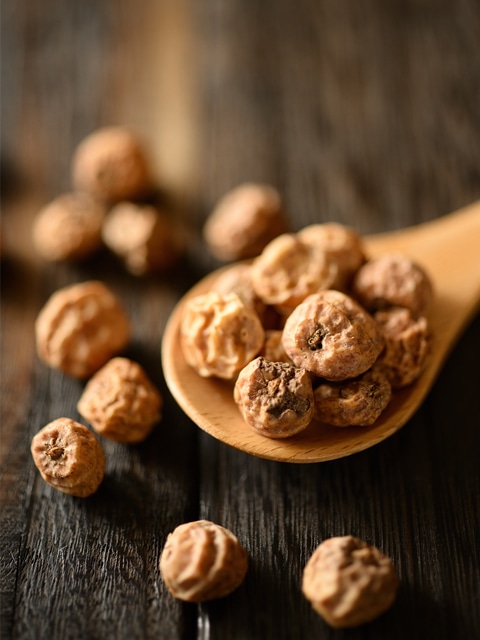


 Add to favorites
Add to favorites
 Tiger nuts go many different names; Zulu nut, yellow nutgrass, ground almond, chufa, edible rush, and rush nut. In Nigeria, the Hausas call it “Aya,” Yorubas “imumu,” the igbos “ofio,” “aki Hausa” in southern Nigeria. They are usually preserved by sun-drying for about three months before storage. They can be eaten raw, dried, roasted, grated and turned into flour.
Tiger nuts go many different names; Zulu nut, yellow nutgrass, ground almond, chufa, edible rush, and rush nut. In Nigeria, the Hausas call it “Aya,” Yorubas “imumu,” the igbos “ofio,” “aki Hausa” in southern Nigeria. They are usually preserved by sun-drying for about three months before storage. They can be eaten raw, dried, roasted, grated and turned into flour.
The nuts themselves have the texture of hazelnuts but way chewier. Once blended with water, it creates a naturally sweet milk, with an almost vanilla flavor that doesn’t need anything added to create the delicious and delicate taste. But nothing is stopping you from adding other wonderful flavors to enhance its greatness.
To be honest, I have read some mixed reviews between manufacturing sites regarding the whole soaking issue. TigerNutUSA states, “The level of anti-nutrients such as tannins, alkaloids, and polyphenols is drastically reduced by soaking in water for 6 hours, thereby making it free of unwanted elements especially in making the milk [source].” Organic Gemini (another producer) states that they can be eaten right out of the bag. They do state though, that they can be soaked to soften and enhance the flavor.
I must share this again… Tiger Nuts are – NOT NUTS, they are Tubers! They are one of the top sources of resistant starch, a prebiotic fiber that resists digestion and becomes fuel for our probiotic bacteria. They are remarkably nutrient-dense as well. They provide as much iron as red meat, as much potassium as coconut water, and are high in magnesium, zinc, phosphorus (phosphorus is the second most plentiful mineral in your body, calcium being first. Your body needs phosphorus for many tasks, such as filtering waste and repairing your tissues and cells.) For more clinical research, click (here).
They are also 100% Gluten-Free, 100% Organic, 100% NUT FREE, 100% Allergen Free, 100% Dairy Free, High in Fiber, Low in Calories & Fats, High in Nutrition, Non-GMO, Paleo Perfect and Raw! They are also suitable for low carb diets since the tubers are one of the top sources of resistant starch, a prebiotic fiber that resists digestion and becomes fuel for our probiotic bacteria. ALL this is truly something to get excited about.
So far, I have tested two versions of the Tiger Nuts, the Premium Organic Tiger Nuts and Supreme Peeled Tiger Nuts. The difference nutritionally is fiber. The Premium Organic has 33% fiber, and the Supreme Peeled has 23% fiber. Otherwise, they have the same nutritional values. Visually their coloring differs; the Premium Organic is a darker brown and has a thin skin (not shell) on them. They are still edible with the skin on. The Supreme Peeled is a pale blonde color since the skin has been removed.
Soaking the Tiger Nuts
Can tigernut,dates, coconut be soaked in the freezer for 4night in an enclosed container
Good morning Merci,
I am not sure I understand. Do you mean individually, are you soaking all of them together? Please share a bit more detail so I can help. blessings, amie sue
How long do they store after they have been soaked?
hello Kim, if you are not drying them, I would keep them in water in the fridge for up to 5 days. I am not in the habit of keeping freshly soaked nuts around so that is an estimate. blessings, amie sue
Is soaking tiger nuts more digestible way to eat them or is roasting them? Thanks.
Hello Lisa,
I find that soaking all the nuts, seeds, and grains that I eat… I digest them better. So, that is always my recommendation. You can always try both ways and see how you feel. Blessings, amie sue
After soaking do they roast up easily or does that not matter that they are soaked or not for the roasting aspsect. I want them roasted in the end but want to soak to remove the oxalate content.
Thanks
Hello Mike,
I typically don’t roast the tiger nuts due to the applications in which I use them. I have read that they do indeed roast up well after soaking though. I would do a small batch and test this technique to see if you like the outcome. Blessings, amie sue